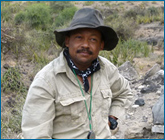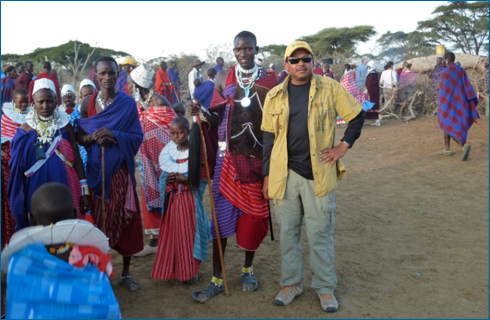The work of Jackson Njau
by the Understanding Evolution team

People all over the planet have a connection to human evolutionary history through the lines of descent that link us to our African ancestors. But for paleoanthropologist Jackson Njau, the connection to human evolution is even more immediate and traces to his childhood. Jackson grew up in Moshi, Kilimanjaro, near Olduvai Gorge — a site that has yielded fossils of Australopithecines, Homo habilis, Homo erectus, and other human ancestors, as well as spectacular evidence of the earliest human technology, stone tools. His uncle was among the first Tanzanian senior archaeologists at the dig, and Jackson had an early fascination with the work of British paleoanthropologists Mary and Louis Leakey, who started working at Olduvai in the 1930s.
Today, Jackson is a professor of geological sciences at Indiana University, but he returns to Africa each summer — to Olduvai and other paleoanthropological sites in Tanzania — to continue his own investigations. Though the terrain at his dig sites may be familiar, he (thankfully) has no childhood experience with the focus of his research today: crocodile predation on early hominids.

In this research profile, we will explore these key questions:
- What is taphonomy, and how is it studied?
- How can studies of modern organisms enrich our understanding of fossilization?
- How can taphonomic clues help us reconstruct and understand ancient ecosystems?
- What is stratigraphy?
Get tips for using research profiles, like this one, with your students.
This material is based upon work supported by the National Science Foundation under Grant Number 1044392. Any opinions, findings, and conclusions or recommendations expressed in this material are those of the author(s) and do not necessarily reflect the views of the National Science Foundation.
